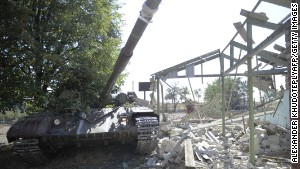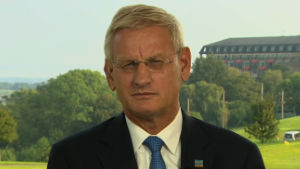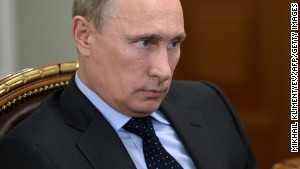Shelling near two cities rocks fragile ceasefire in eastern Ukraine
September 7, 2014 -- Updated 1825 GMT (0225 HKT)=
Mariupol, Ukraine (CNN) -- Shelling hit areas near two key cities in eastern Ukraine on Sunday, intensifying fears that a ceasefire that took effect less than two days ago may be falling apart.
The fledgling truce
between the Ukrainian government and pro-Russian rebels began Friday
evening, and both sides were already accusing each other of violating it
by Saturday.
Sporadic artillery and
machine gun fire rang out in the early hours of Sunday on the outskirts
the strategic port city of Mariupol. A gas station was set on fire, and
cars carried wounded civilians down the roads.
Shelling and explosions
were also heard near the airport of the flashpoint city of Donetsk on
Sunday morning, the city council said on its website.
 Explosions in Mariupol amid ceasefire
Explosions in Mariupol amid ceasefire
 Swedish minister outlines Russia measures
Swedish minister outlines Russia measures
 NATO to pressure Russia over Ukraine
NATO to pressure Russia over Ukraine
In both cities, the source of the weapons fire wasn't immediately clear.
The Mariupol city
government said that pro-Russian rebels had carried out the shelling
near the city overnight. It said one woman was killed and three people
wounded.
The Russian state news
agency ITAR-Tass late Saturday quoted rebel officials as saying that
Ukrainian forces continued to shell Donetsk and rebel positions near
Mariupol. The RIA Novosti news agency reported that four Donetsk
residents were killed in the shelling.
Ukrainian National
Security and Defense Council spokesman Col. Andriy Lysenko told
reporters in Kiev on Saturday that the situation was calmer than before
the truce, but that there had been a number of "provocations" by rebels.
They included 10 instances of shelling in the Donetsk and Luhansk
regions, he said.
In a sign the government
was still hoping to stick to the ceasefire deal, Lysenko said a prisoner
exchange would begin soon, although he didn't specify a time or date.
'So much confusion'
Ukrainian forces and
pro-Russian rebels have been locked in vicious fighting in eastern
Ukraine since April, leaving more than 2,200 people dead, according to
the United Nations.
The conflict has
triggered a humanitarian crisis in the region, where shelling has
destroyed homes and infrastructure. Nationwide, more than a million
people have been displaced from their homes by the fighting, most of
them in the East.
One old man in Mariupol shook his head gloomily when asked if he thought the ceasefire would last.
"There is so much
confusion," Gennady Andreyavich said. "We really don't know what will
happen, because when people say we must live in a united Ukraine and we
see at the same time Ukrainian forces in retreat -- what should we
think?"
Ukrainian forces and the
rebels have engaged in fierce fighting over the past week in the
territory between the Russian border and Mariupol.
A previous unilateral ceasefire declared by the Ukrainian government in June broke down after 10 days.
Poroshenko and Putin talk
Ukrainian President
Petro Poroshenko had a phone conversation with Russian President
Vladimir Putin after the signing of the ceasefire deal in the Belarusian
city of Minsk, Poroshenko's office said Saturday in a statement.
The leaders agreed that
the ceasefire in eastern Ukraine has been mostly upheld and they
discussed further steps to make the truce last, the statement said.
Some areas at the heart of the conflict reported that calm was prevailing.
Luhansk city council
said that Saturday was the first day in over a month with no shooting.
The city office has started working on repairs to the power and water
supply.
Russian warning over sanctions
In spite of the ceasefire agreement, Putin remains under pressure from the West over Russia's actions in Ukraine.
The Ukrainian government
and the West accuse Moscow of supporting the rebels with weapons and
fighters -- allegations that Moscow has repeatedly denied.
Hours after the truce
went into effect, EU leaders meeting in Brussels, Belgium, agreed on a
new round of economic sanctions against Russian interests. They are due
to be formally adopted on Monday.
Earlier last week, Poroshenko hinted at other ways that the West might aid Ukraine.
At a news conference
during the NATO summit on Thursday, Poroshenko said Western powers
assured him that the possibility of lethal aid was on the table, in
addition to nonlethal aid.
"As a result of our
bilateral consultations, almost every country stated its assistance to
Ukraine," Poroshenko said. "First and foremost, this concerns military
and technical cooperation, both nonlethal and lethal weapons, including
precision guidance weapons."
The United States, France and other NATO allies have not independently confirmed whether lethal aid is an option.
Russia's Foreign
Ministry warned Saturday that if new EU sanctions are imposed, Russia
"certainly will respond," ITAR-Tass reported.
Amnesty International, meanwhile, accused Ukrainian militias and rebels of carrying out war crimes. The human rights group singled out Russia for a buildup of armor and artillery in eastern Ukraine.
Putin has voiced
sympathy for the rebels, many of whom are ethnic Russians. But he denies
that Russia has armed and trained the rebels, or sent its troops over
the border.
CNN's Diana Magnay reported from Mariupol,
and Jethro Mullen wrote and reported from Hong Kong. CNN's Laura
Smith-Spark, Lindsay Isaac, Reza Sayah, Michael Martinez and Alla
Eshchenko contributed to this report. Journalist Victoria Butenko also
contributed from Kiev.

No comments:
Post a Comment